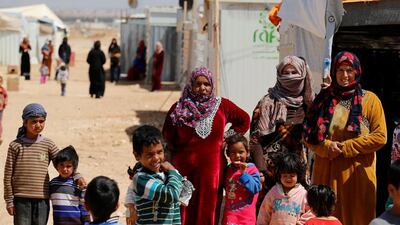AL ZAATARI CAMP, JORDAN // When you consider that almost 80,000 people are crammed into a 5.3 square kilometre refugee camp, undoubtedly there will be a need for goods and services, and where a need arises, enterprising people will look to fulfil that and make some money in the process.
Down the bustling, narrow streets of the Al Zaatari camp, you could almost be forgiven for thinking that the customers and traders haggling from early morning until about 10pm are living regular lives. Traders lure in customers with special prices, while customers try to find the best bargains to fit their meagre budgets. But the people here are far from their homes in Syria, victims of the war that has devastated their homeland.
Among the hundreds of little huts made into shops, fresh produce, bakeries, mobile phone shops and even jewellery shops can be found on a street jokingly referred to by those who live there as the Champs-Elysees of Al Zaatari Camp. Women, children and men’s clothes, and even bridal shops, are available to those who can afford it.
If there is a need to change foreign currency, there is an exchange for that in the souk, and if a bicycle breaks down or a new one is required, there is a wealth of options. Estimates suggest there are as many as 3,000 informal shops and businesses within Al Zaatari.
Yasir Mohammed, 55, borrowed 1,000 Jordanian dinars (Dh5,180) to kickstart his business selling spices and home appliances.
“My old age and my medical condition has left me incapable of working like the younger generation inside or outside the camp, so I decided to start my own shop,” he said.
“I bought the spices and appliances from other wholesalers in the camp. I operate from 9am to 10pm, and I spend my time touting for business and trying to generate as much income as I can,” said the father of eight.
Thyme, rosemary, coriander, cumin, tarragon, cinnamon, pepper and Arabian spice are some of the items he sells. Competition is fierce and he allows himself only small a profit margin so that his business stays afloat.
“I have to accommodate and build a customer base, therefore I sell my products sometimes without any profit, just to earn a new customer,” he said. “I tend to keep a ledger book for close and known customers who buy items from me and pay me back at the end of the month or whenever they have money,” said Mr Mohammed, who has two wives.
“I am proud that I can still have the capacity to earn some money, and compete with other traders in the camp, even if the sales and revenues are meagre.”
Running his business brought a sense of normality to him and his family, as he was able to provide for them after fleeing Syria for the camp three years ago.
“Since our displacement and seeking refuge in Jordan, our lives have been turned upside down,” Mr Mohammed said. “We fled from Deraa and came to Jordan, leaving everything behind us.”
Next door to Mr Mohammed’s spice shop stands Ahmad Abdullkareem, a 21-year-old employee in a food store whose wife is expecting their first child during Ramadan.
“We sell crisps, sweets, juices, cooking oil and a lot of essential cooking items,” said the Syrian father to be who earns three dinars (Dh15) per day.
“There is business, however the competition in the camp is fierce, and the margins of profit are really low. On a really good day, our sales generate around JD100 (Dh500) but a maximum of 10 to 20 per cent of that is profit.”
Mr Abdullkareem is the sole provider for his family, which consists of his wife, mother, an aunt and a little brother.
“We are living on a day-to-day basis here as we never know what tomorrow may bring,” he said.
“I am only concerned with supporting my family here, and how will I be able to provide for my child when he comes to life next month.
“I hope by the time he is ready to go to school, we would be back in Syria, restarting our shattered lives and living in a nice home.”
tzriqat@thenational.ae

